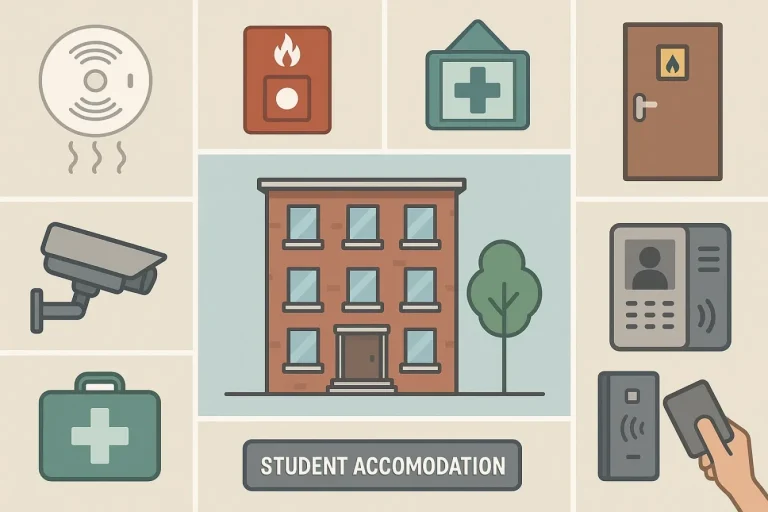Are you struggling to find the right English language schools in UK that offers quality education, proper accreditation, and genuine support for international students? With over 600,000 students coming to the UK annually to learn English, choosing the wrong institution can waste precious time and money while failing to achieve your language goals.
English language schools UK have become increasingly competitive, making it challenging for international students to identify institutions that truly deliver value. This comprehensive guide will help you navigate the complex landscape of UK English education, ensuring you make an informed decision that aligns with your academic and career objectives.
By the end of this guide, you’ll know how to identify top-quality English language schools in the UK, understand the accreditation standards that matter, and discover practical steps to secure your place at a reputable institution while finding suitable accommodation through platforms like Uninist.
The Current State of English Language Education in the UK
The UK remains the world’s premier destination for English language learning, attracting students from every corner of the globe. Recent data shows that 349,679 English language students studied at accredited member centres in 2024, with 335,750 on full-time courses. This significant enrollment demonstrates the continued trust international students place in UK educational institutions.
The government met its 2030 international student recruitment target of 600,000 ten years early, with numbers continuing to increase since 2020. This growth reflects the UK’s commitment to maintaining its position as a global education hub while ensuring quality standards remain high.
The diversity of international students is remarkable, with 64% of international students whose preferred main language was not English, yet 59.3% reported being able to speak English very well. This statistic highlights both the challenge and opportunity that English language schools face in catering to students with varying proficiency levels.
Understanding British Council Accreditation Standards
When selecting English language schools UK institutions, accreditation serves as your primary quality indicator. The British Council accredits English schools in the UK in partnership with English UK, requiring accredited schools to offer high standards of teaching, management, resources, environment, facilities, welfare, and care of under 18s.
Accreditation UK is a quality assurance scheme for schools, colleges, and universities offering English as a Foreign Language (EFL) courses, providing quality assurance to international students planning to take English language courses in the UK.
Key Accreditation Benefits:
Quality Assurance: Independent inspectors conduct regular inspections covering teaching standards, premises, and accommodation quality.
Complaints Procedure: The British Council maintains an independent complaints procedure, offering protection for student interests.
Visa Requirements: Many visa applications require proof of enrollment at accredited institutions.
Transfer Options: Credits from accredited schools are more likely to be recognized by other educational institutions.
Top Categories of English Language Schools in UK
Private Language Schools
Private institutions often provide the most flexibility and specialized programs for international students. These schools typically offer:
- Intensive English programs
- Exam preparation courses (IELTS, TOEFL, Cambridge)
- Business English specializations
- One-to-one tutoring options
- Flexible start dates throughout the year
University-Affiliated Language Centers
Many UK universities operate dedicated language centers that provide:
- Pathway programs to degree courses
- Academic English preparation
- Integration with campus facilities
- Access to university resources
- Potential progression to undergraduate or postgraduate programs
International College Networks
Large educational networks offer consistency across multiple locations:
- Standardized curriculum delivery
- Transfer opportunities between campuses
- Established support systems for international students
- Comprehensive accommodation services
- Multi-level progression pathways
Step-by-Step Guide to Choosing the Right English Language School
Step 1: Assess Your Learning Objectives
Define your specific goals before researching schools:
- Academic Preparation: If you plan to pursue higher education in the UK
- Professional Development: For career advancement in English-speaking environments
- General Proficiency: To improve overall communication skills
- Exam Preparation: To achieve specific test scores for visa or university requirements
Step 2: Verify Accreditation Status
Always confirm that your chosen school holds proper accreditation:
- Check the British Council’s official accredited centres list
- Verify English UK membership status
- Review recent inspection reports
- Confirm visa sponsor status if you need a student visa
Step 3: Evaluate Course Structure and Content
Examine the curriculum details carefully:
- Class Size: Smaller classes (8-12 students) typically provide better individual attention
- Contact Hours: Ensure adequate weekly contact time (minimum 15 hours for student visa requirements)
- Skill Balance: Look for courses covering speaking, listening, reading, and writing equally
- Assessment Methods: Regular progress testing and feedback mechanisms
Step 4: Research Faculty Qualifications
Quality instruction depends on qualified teachers:
- TESOL/TEFL certifications
- University degrees in relevant fields
- Native or near-native English proficiency
- International teaching experience
- Ongoing professional development participation
Step 5: Investigate Support Services
International students need comprehensive support:
- Academic Support: Study skills workshops and learning resources
- Pastoral Care: Welfare officers and counseling services
- Accommodation Assistance: Help finding suitable housing options
- Social Programs: Cultural activities and integration opportunities
- Career Guidance: Job search support and CV writing assistance
Essential Factors When Selecting English Language Schools UK
Location Considerations
Your school’s location significantly impacts your learning experience:
London: Offers maximum cultural diversity and career opportunities but comes with higher living costs and intense urban environment.
Edinburgh: Provides rich cultural heritage and relatively affordable living while maintaining high educational standards.
Manchester: Combines vibrant student life with reasonable costs and strong industrial connections.
Brighton: Delivers seaside charm with proximity to London and active arts scene.
Cambridge/Oxford: Offers prestigious academic environments but with premium pricing and competitive atmospheres.
Cost Analysis Framework
Understanding the true cost of English language education helps in making informed decisions:
Tuition Fees: Range from £200-£600 per week depending on location and intensity
Accommodation: £100-£300 per week varying by city and housing type
Living Expenses: £150-£400 per week including food, transport, and entertainment
Additional Costs: Registration fees, materials, examination fees, and visa costs
Class Structure and Teaching Methodology
Modern English language schools employ various teaching approaches:
Communicative Language Teaching: Emphasizes real-world communication over grammar rules
Task-Based Learning: Students complete meaningful tasks using English naturally
Blended Learning: Combines face-to-face instruction with online components
Immersive Experiences: Integration of cultural activities and real-world practice
Technology Integration in Modern English Schools
Contemporary English language schools UK institutions increasingly leverage technology to enhance learning outcomes:
Digital Learning Platforms: Online portals providing 24/7 access to learning materials and progress tracking
Interactive Whiteboards: Multimedia presentations and collaborative learning activities
Mobile Applications: Vocabulary building and pronunciation practice on-demand
Virtual Reality: Immersive environments for practical conversation practice
AI-Powered Assessment: Personalized feedback and adaptive learning pathways
Accommodation Solutions for International Students
Finding suitable accommodation remains a primary concern for international students. Quality English language schools often partner with accommodation providers or offer guidance on housing options.
On-Campus Residences: Some university-affiliated language centers provide campus accommodation with meal plans and integrated support services.
Homestay Programs: Living with local families offers cultural immersion and additional English practice opportunities.
Private Student Housing: Purpose-built student accommodations provide independence with community benefits.
Shared Apartments: Cost-effective options allowing cultural exchange with other international students.
Platforms like Uninist specialize in connecting international students with verified accommodation options across UK cities, ensuring safe and suitable housing arrangements that complement your language learning journey.
Visa Requirements and Application Process
Understanding visa requirements is crucial for international students:
Student Visitor Visa (Short-term Study)
For courses up to 6 months:
- No work permitted
- Cannot extend or switch to other visa types
- Must demonstrate sufficient funds
- Requires acceptance letter from accredited institution
Student Visa (General)
For longer courses or progression to higher education:
- Can work part-time (up to 20 hours per week during term time)
- Possible to extend or switch visa categories
- Requires Confirmation of Acceptance for Studies (CAS) from licensed sponsor
- Higher financial requirements and English proficiency proof
Cultural Integration and Social Opportunities
Successful language learning extends beyond classroom instruction. Top English language schools UK institutions provide extensive cultural integration programs:
Welcome Orientation: Comprehensive introduction to UK culture, educational systems, and local customs
Social Activities: Regular events including museum visits, theater performances, and historical tours
Conversation Clubs: Informal speaking practice with native speakers and other international students
Volunteer Opportunities: Community service projects providing real-world English practice
Sports and Recreation: Access to fitness facilities and organized sporting activities
Cultural Celebrations: Participation in traditional UK festivals and international cultural exchanges
Career Development and Networking Opportunities
Many English language schools recognize that students have professional aspirations beyond language learning:
Professional English Courses: Specialized programs for specific industries like healthcare, engineering, or finance
CV and Interview Workshops: Practical skills for UK job market entry
Networking Events: Connections with local professionals and alumni networks
Internship Programs: Work experience opportunities with local businesses
University Preparation: Guidance for progression to undergraduate or postgraduate studies
Quality Indicators to Look For
When evaluating English language schools UK options, consider these quality markers:
Academic Excellence Indicators
Inspection Reports: Recent British Council inspection results with strengths identified across all criteria
Student Outcomes: High pass rates for external examinations and successful university progressions
Teacher Qualifications: Minimum DELTA/TESOL qualifications with ongoing professional development
Curriculum Innovation: Regular updates to teaching materials and methodologies
Student Satisfaction Metrics
Retention Rates: High percentage of students completing their chosen courses
Recommendation Rates: Strong word-of-mouth referrals from former students
Graduate Feedback: Positive testimonials about post-course achievements
Independent Reviews: Consistently high ratings on educational review platforms
Planning Your Application Timeline
Strategic planning ensures smooth application processes:
6 Months Before Starting
- Research and shortlist potential schools
- Begin visa application preparation
- Arrange necessary documentation (transcripts, certificates)
- Start accommodation search process
3 Months Before Starting
- Submit school applications with required documents
- Begin visa application process
- Secure accommodation arrangements
- Arrange travel and insurance
1 Month Before Starting
- Finalize pre-arrival preparations
- Complete any required pre-course assessments
- Confirm accommodation details
- Plan arrival logistics
Making the Most of Your English Learning Experience
Success in English language schools UK depends on active engagement beyond classroom attendance:
Set Clear Goals: Establish specific, measurable objectives for each course module
Practice Daily: Dedicate time to English practice outside formal instruction
Engage Socially: Participate in school activities and build relationships with classmates
Explore the Culture: Take advantage of your UK location to experience British culture firsthand
Seek Feedback: Regularly discuss progress with teachers and seek improvement suggestions
Document Progress: Keep a learning journal to track improvements and challenges
Your Next Steps to English Language Success
Choosing the right English language school in the UK represents a significant investment in your future. The landscape of English language schools UK offers exceptional opportunities for international students willing to research thoroughly and commit fully to their language learning journey.
The key to success lies in selecting an accredited institution that aligns with your specific goals, provides comprehensive support services, and maintains high teaching standards. Remember that your choice of accommodation can significantly impact your overall experience, making it essential to secure suitable housing that supports your academic objectives.
Ready to begin your English language learning adventure in the UK? Book a free consultation with Uninist today to discover verified accommodation options that will complement your studies at top English language schools across the UK. Our expert team understands the unique needs of international students and can help you find the perfect housing solution that enhances your language learning experience while providing a safe, comfortable home away from home.
Don’t let accommodation concerns delay your educational goals. Contact Uninist now and take the first step toward your successful English language learning journey in the UK.
FAQ
What are the best English language schools in the UK for international students in 2025?
The top English language schools in the UK include British Council accredited institutions like London School of English, Wimbledon School of English, and Concorde International. These schools offer quality English courses with excellent teaching standards, modern facilities, and comprehensive student support services for international learners seeking to improve their English proficiency.
How much do English language courses cost at UK language schools?
English language course fees in UK schools typically range from £200-£600 per week depending on the institution, course intensity, and location. London-based schools generally charge higher fees, while schools in smaller cities offer more affordable options. Additional costs include accommodation, materials, and registration fees for comprehensive English learning programs.
Do I need a visa to study at English language schools in the UK?
International students from non-EU countries typically require a Student Visa or Short-term Study Visa to attend English language schools in the UK. The visa type depends on course duration and nationality. Students must choose British Council accredited schools to meet visa requirements and ensure quality education standards.
What English language qualifications can I obtain from UK language schools?
UK language schools offer various English qualifications including IELTS preparation, Cambridge English certificates (FCE, CAE, CPE), and General English courses. Many schools provide exam preparation courses, business English programs, and academic English qualifications that are internationally recognized by universities and employers worldwide.
Which cities in the UK have the best English language schools?
London, Cambridge, Oxford, Brighton, and Manchester host some of the UK’s top English language schools. London offers the most variety with prestigious institutions, while Cambridge and Oxford provide academic environments. Brighton and Manchester offer excellent quality education at more affordable costs for international students.
How do I choose the right English language school in the UK?
Choose British Council accredited English language schools that match your learning goals, budget, and preferred location. Consider factors like class sizes, teaching methodology, student support services, accommodation options, and course flexibility. Research school reviews, inspection reports, and success rates to make an informed decision.
What accommodation options are available for English language students in the UK?
UK English language schools typically offer homestay families, student residences, shared apartments, and private accommodation options. Homestay provides cultural immersion with local families, while student residences offer independence and social opportunities. Many schools partner with accommodation providers to ensure safe, comfortable housing for international students.
Are UK English language schools worth the investment for international students?
UK English language schools offer exceptional value through native speaker instruction, cultural immersion, internationally recognized qualifications, and access to higher education opportunities. The investment provides long-term career benefits, improved English proficiency, and valuable cultural experiences that enhance personal and professional development for international students.
What support services do UK English language schools provide for international students?
Top UK English language schools provide comprehensive support including airport transfers, orientation programs, academic counseling, visa guidance, social activities, and 24/7 emergency assistance. Schools offer career advice, university preparation, cultural integration programs, and multilingual support staff to ensure international students succeed academically and socially.
How long should I study at an English language school in the UK?
The ideal study duration depends on your current English level and goals. Beginner students typically need 6-12 months for significant improvement, while intermediate learners may require 3-6 months. Advanced students often study 4-12 weeks for specific qualifications. Consult with schools to determine appropriate course length based on assessment results.








